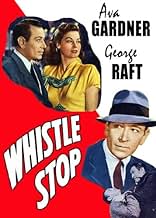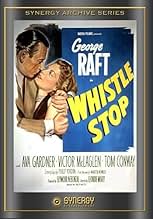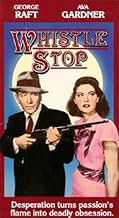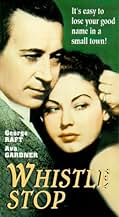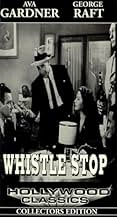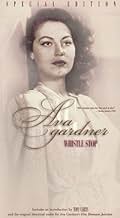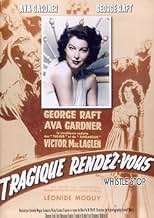IMDb RATING
5.5/10
1.4K
YOUR RATING
After beautiful Mary returns home to her "whistle stop" home town, long-standing feelings of animosity between two of her old boyfriends leads to robbery and murder.After beautiful Mary returns home to her "whistle stop" home town, long-standing feelings of animosity between two of her old boyfriends leads to robbery and murder.After beautiful Mary returns home to her "whistle stop" home town, long-standing feelings of animosity between two of her old boyfriends leads to robbery and murder.
Ewing Miles Brown
- Townsman
- (uncredited)
Jack George
- Joe - Barber Shop Customer
- (uncredited)
Robert Homans
- Sheriff
- (uncredited)
Broderick O'Farrell
- Barfly
- (uncredited)
Jeffrey Sayre
- Fran's Dance Partner
- (uncredited)
- Director
- Writers
- All cast & crew
- Production, box office & more at IMDbPro
Featured reviews
I wanted to see this movie because I had read the novel "Whistle Stop" which was written by Maritta Wolff when she was a college student and was recently republished. The novel gave a great presentation of the Post Depression era and Wolff's beautifully descriptive writing won her a prestigious award. The scriptwriter changed the story significantly. While one part would probably have been too sensitive for the time, I think today's movie writers would portray more of Wolff's imagery of life on both "sides of the tracks". I doubt if an author today would allow his or her book to be an inspiration to a screenwriter who would use some characters and some dialogue yet change the story so dramatically. I thoroughly enjoyed seeing the movie AFTER reading the book as it was fascinating to see the similarities and the differences. I'd recommend reading the book and then enjoying the mid-1940's black & white film with the gorgeous Ava Gardner and a young Victor McLaghlin. This certainly isn't the best of '40's crime drama but it was fun to see. If you've already seen the movie, read the book!!
This turkey came as an entry in a set of eight noir DVD's. I almost returned the set on the basis of this single movie. Leonard Maltin's Film Guide charitably characterizes the 82 minutes as "stupid". In my little book, that's too generous. From the cheap sets, to the slack direction, to the incoherent script, the movie's nearly laughable, especially when a zombified 51- year old George Raft deadpans sweet nothings into the luscious ear of 24-year old Ava Gardner. It's enough to make you want to call the cops or check your eyeglasses. And that's when Raft's not playing the wayward son of parents maybe 10 years closer to retirement than he is. If he could show a little emotion, he might get away with it, but you almost have to stick a fork in him to make sure he's breathing. Raft doesn't so much walk through the part as blankly stare his way through. No wonder the script turns to McLaglen to carry the action through the last third. And the miscasting doesn't stop with Raft. The sleekly urbane Tom Conway of British accent fame is cast as a small town hood, no less. It's as if both Conway and Raft got confused about which movie they were supposed to be in, and wandered onto the wrong set. Of course, there's the compensation of a ravishing Gardner for the guys, and in a flimsy dressing gown, no less. Too bad, her ability to do anything with the muddled script sort of comes and goes. The sometimes brilliant Philip Yordan's name is on the screenplay, but I can't believe it's actually his. The plot simply meanders all over the page like a bottle of spilled ink. There's no need to go on. This may be somebody's idea of noir, but the shovel has to scrape bottom to find it. Too bad mine did.
Whistle Stop (1946)
The style is pure film noir but the plot is not. A curious blend at the time of the first noirs at the end of WWII (this one is actually copyright 1945). It has two strong headliners, though some might argue this--George Raft is always a bit less than he wants to be and Ava Gardner is simply young and charming, before her great later roles. It does have a great idea--a beautiful woman has returned to the simple little town where she grew up wanting to see if her true love was still what she thought.
And so Gardner steps off the train at the whistle stop wearing furs, and mentioning her rich lovers left behind in Chicago. She looks at George Raft and thinks he's still a handsome guy, maybe it'll work. But she soon learns Raft is still a loser. And that another guy in town, with lots more money, still has the hots for her. It takes about one scene to switch her game plan.
It's called "Whistle Stop" because it's such a small town on the train line the train doesn't stop unless a signal is put out that a passenger is waiting. Then it blows its whistle and stops. (It also blew its whistle when it had a passenger, Gardner, who wanted to get off, so the whole town, if listening, would say, "Oh, the train's stopping." This becomes important later when Raft gets involved in a way to both make some quick major cash and get even with his rival.
But I should finally say the plot and direction are horribly put together. After awhile the four of us watching were speaking out, after a half hour of really rapt silence, saying, "What?" Or, "Now way." That is, the most improbable flip-flopping of emotions and inconsistent characters keeps adding up until you just can't quite get it. What's worse is it was all really avoidable with some minor thinking. You get the sense that maybe it got re-edited after shooting was done, maybe to create a different flow, or shorten it, or change the ending, and they just didn't have the pieces that needed to make it make sense. Whatever the reason, all these heartfelt, gritty, intense situations fall slightly flat. Just slightly--the movie is sort of watchable--but you have to like this period of movies to see all the great things going on otherwise.
Like the filming--great noir-ish darkness and high contrast, wonderful tight framing, and a few shots in a few scenes that you could study for their simple effectiveness. This is what keeps it going. And the whole scene is great, the little town, the back rooms and odd characters, the family at home. None of it is fully fleshed out, but it's all there to look at at least.
And a last point--the only copy I could find was streaming on Amazon, and it's a terrible print--there must be a hundred little gaps and jumps where both the sound and picture skip a second. Beware of that. Too. But Ava, well, she's got a career ahead of her, and she brings her scenes alive.
The style is pure film noir but the plot is not. A curious blend at the time of the first noirs at the end of WWII (this one is actually copyright 1945). It has two strong headliners, though some might argue this--George Raft is always a bit less than he wants to be and Ava Gardner is simply young and charming, before her great later roles. It does have a great idea--a beautiful woman has returned to the simple little town where she grew up wanting to see if her true love was still what she thought.
And so Gardner steps off the train at the whistle stop wearing furs, and mentioning her rich lovers left behind in Chicago. She looks at George Raft and thinks he's still a handsome guy, maybe it'll work. But she soon learns Raft is still a loser. And that another guy in town, with lots more money, still has the hots for her. It takes about one scene to switch her game plan.
It's called "Whistle Stop" because it's such a small town on the train line the train doesn't stop unless a signal is put out that a passenger is waiting. Then it blows its whistle and stops. (It also blew its whistle when it had a passenger, Gardner, who wanted to get off, so the whole town, if listening, would say, "Oh, the train's stopping." This becomes important later when Raft gets involved in a way to both make some quick major cash and get even with his rival.
But I should finally say the plot and direction are horribly put together. After awhile the four of us watching were speaking out, after a half hour of really rapt silence, saying, "What?" Or, "Now way." That is, the most improbable flip-flopping of emotions and inconsistent characters keeps adding up until you just can't quite get it. What's worse is it was all really avoidable with some minor thinking. You get the sense that maybe it got re-edited after shooting was done, maybe to create a different flow, or shorten it, or change the ending, and they just didn't have the pieces that needed to make it make sense. Whatever the reason, all these heartfelt, gritty, intense situations fall slightly flat. Just slightly--the movie is sort of watchable--but you have to like this period of movies to see all the great things going on otherwise.
Like the filming--great noir-ish darkness and high contrast, wonderful tight framing, and a few shots in a few scenes that you could study for their simple effectiveness. This is what keeps it going. And the whole scene is great, the little town, the back rooms and odd characters, the family at home. None of it is fully fleshed out, but it's all there to look at at least.
And a last point--the only copy I could find was streaming on Amazon, and it's a terrible print--there must be a hundred little gaps and jumps where both the sound and picture skip a second. Beware of that. Too. But Ava, well, she's got a career ahead of her, and she brings her scenes alive.
Returning from Chicago swathed in fur, small-town gal Ava Gardner precipitates a crisis for ne'er-do-well George Raft, who stayed behind to moulder. Gardner hadn't yet reached the apex of her insolent sexuality (she looks close to plain in some scenes), and Raft plays, what else, George Raft. Whistle Stop is no masterpiece, but it intermittently sparks into life, generally when Victor McLaghlin shows up, trying to lure Raft into a murderous scheme or taking revenge on his sneering boss. The Madacy video of this movie is recorded at cheap EP speed taken from a scratchy print (standard practice for the firm). But then this movie isn't worth more than the three or four bucks it takes to pick up a copy.
In the late 1930s, George Raft was at the top of the movie business. He had a lot of prestige at Warner Brothers and looked destined for greatness. However, after a very long string of insane career choices (rejecting the lead in such films as "High Sierra" and "The Maltese Falcon"--all of which made Bogart a top star), his clout suddenly vanished and he played out the 1940s in a string of progressively less prestigious and uninteresting films. When "Whistle Stop" debuted, he was already well on the way to becoming a second or third tier actor--and unfortunately, his performances generally looked second or third-rate as well. I've seen quite a few of these later films and can only describe his performances as 'wooden'.
"Whistle Stop" has a major handicap at the onset. Raft is cast opposite Ava Gardner as the love interest--though he was over 20 years older and seemed ill-suited and ill-at-ease in this romantic role. And, frankly, this wasn't all Raft's fault. I especially cringed at the flashback scene where they tried to make Raft and Gardner look like teenagers--his hairstyle was pretty funny and he looked like a 45 year-old man trying to be young and hip (which he was).
The film begins with Gardner returning to the small town where she grew up but had left in order to live in the excitement of Chicago. It soon becomes apparent that she and Raft (oddly cast as a small-town sort of guy) had a past history together...but was distracted by both the lure of Chicago and the tough and rich Tom Conway. And, ultimately, Conway and Raft fought it out for her. Raft won the fight, but she left with Conway...but now, years later, she is back. But can she pick up where she and Raft left off? One thing getting in their way is the directionless way Raft's life has become--as if he didn't care about tomorrow. Can he clean up his act and win the girl? And, will Conway make trouble for Raft now that he's apparently won Gardner? In addition to these actors, Victor McLaglen is on hand to play a bartender and Raft's pal. His character, frankly, is a bit hard to understand. Who his is and why he's there is pretty vague. Fortunately, this all becomes clear at the end--and it is a nifty one--making up for the general blandness of the rest of the film. The film has a few nice twists but also gives Raft a mostly passive sort of role for the leading man--and not a film that would help him regain his past prestige on the screen.
"Whistle Stop" has a major handicap at the onset. Raft is cast opposite Ava Gardner as the love interest--though he was over 20 years older and seemed ill-suited and ill-at-ease in this romantic role. And, frankly, this wasn't all Raft's fault. I especially cringed at the flashback scene where they tried to make Raft and Gardner look like teenagers--his hairstyle was pretty funny and he looked like a 45 year-old man trying to be young and hip (which he was).
The film begins with Gardner returning to the small town where she grew up but had left in order to live in the excitement of Chicago. It soon becomes apparent that she and Raft (oddly cast as a small-town sort of guy) had a past history together...but was distracted by both the lure of Chicago and the tough and rich Tom Conway. And, ultimately, Conway and Raft fought it out for her. Raft won the fight, but she left with Conway...but now, years later, she is back. But can she pick up where she and Raft left off? One thing getting in their way is the directionless way Raft's life has become--as if he didn't care about tomorrow. Can he clean up his act and win the girl? And, will Conway make trouble for Raft now that he's apparently won Gardner? In addition to these actors, Victor McLaglen is on hand to play a bartender and Raft's pal. His character, frankly, is a bit hard to understand. Who his is and why he's there is pretty vague. Fortunately, this all becomes clear at the end--and it is a nifty one--making up for the general blandness of the rest of the film. The film has a few nice twists but also gives Raft a mostly passive sort of role for the leading man--and not a film that would help him regain his past prestige on the screen.
Did you know
- TriviaMack Gray, who plays the replacement bartender, was an old friend of George Raft and his film career consisted mostly of cameos in Raft films.
- Quotes
Josie Veech: Oh, sure, the best time to start looking for a job is 8 o'clock at night, and if you do a good job of looking, you won't get home 'til morning, and the best place for looking is every beer joint and pool hall on Main Street.
- ConnectionsEdited into Mobster Theater: Whistle Stop (2022)
- SoundtracksOnce Again
(uncredited)
- How long is Whistle Stop?Powered by Alexa
Details
- Runtime1 hour 25 minutes
- Color
- Aspect ratio
- 1.37 : 1
Contribute to this page
Suggest an edit or add missing content


